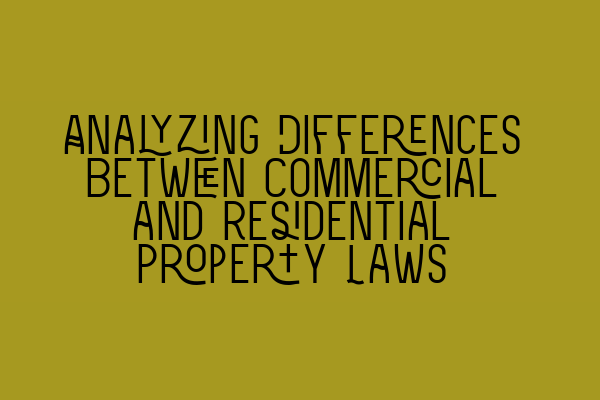Analyzing Differences Between Commercial and Residential Property Laws
When it comes to property law, there are significant differences between commercial and residential properties. Both types of properties have their own unique legal requirements and regulations that property owners, buyers, and investors need to be aware of. Understanding these differences is crucial for solicitors, lawyers, and individuals involved in the property industry.
In this article, we will delve into the nuances of commercial and residential property laws, highlighting their distinctive features and key considerations. Whether you are studying for the SQE exams or simply seeking a better understanding of property law, this article will provide you with valuable insights.
Let’s start by examining the fundamental differences between commercial and residential properties:
1. Purpose of Use:
Commercial properties are primarily intended for business purposes, such as offices, retail stores, warehouses, and industrial buildings. Residential properties, on the other hand, are designed for living, including houses, apartments, condominiums, and other dwellings.
2. Lease Agreements:
Commercial lease agreements tend to be more complex and detailed compared to residential leases. Commercial leases often involve longer terms, extensive negotiations, and provisions related to business operations and maintenance responsibilities. Residential leases generally have shorter terms and focus more on tenant rights, responsibilities, and the use of the property for living purposes.
3. Legal Protections:
Residential tenants typically enjoy stronger legal protections provided by landlord and tenant laws. These laws are designed to protect tenants’ rights, including security of tenure, rent control, and maintenance obligations. Commercial tenants, on the other hand, negotiate their lease terms and have fewer statutory protections, placing more emphasis on robust lease agreements.
4. Property Taxes:
Commercial properties are subject to business property taxes, which are typically higher than residential property taxes. This reflects the fact that commercial properties generate income and contribute to the local economy. Residential properties, on the other hand, are assessed at a lower rate as they do not generate direct income.
5. Planning and Zoning Laws:
Planning and zoning laws regulate the use and development of properties. Commercial properties often face stricter planning and zoning regulations due to their potential impact on the surrounding area, public services, and traffic. Residential properties are subject to different planning and zoning regulations aimed at maintaining the livability and character of neighborhoods.
6. Financing and Mortgages:
Financing commercial properties involves different considerations compared to residential properties. Commercial property loans often require higher down payments, have higher interest rates, and involve more comprehensive assessment of the property’s income potential. Residential mortgages are typically more accessible, with lower down payment requirements and options for government-backed loans.
7. Landlord and Tenant Relationships:
Commercial landlords and tenants generally have more complex and formal relationships compared to residential ones. Commercial leases often involve detailed clauses regarding rental adjustments, maintenance responsibilities, rights to assign or sublet, and dispute resolution mechanisms. Residential tenancies often have standardized rental agreements and legal frameworks that address matters such as security deposits, eviction procedures, and repairs.
In conclusion, understanding the differences between commercial and residential property laws is essential for property professionals and individuals involved in property transactions. Whether you are assisting clients with buying, selling, leasing, or managing properties, having comprehensive knowledge of the distinct legal requirements will greatly benefit your practice.
To deepen your understanding of property law and prepare for the SQE exams, we recommend exploring our related articles:
– SQE 1 Practice Exam Questions: Test your knowledge and readiness for the SQE exams by practicing with our specially designed practice exam questions.
– SQE 1 Practice Mocks FLK1 FLK2: Familiarize yourself with the format and structure of the SQE 1 exams by taking our practice mocks FLK1 and FLK2.
– SQE 2 Preparation Courses: Enhance your knowledge and skills in property law through our SQE 2 preparation courses designed to help you excel in the exams.
– SQE 1 Preparation Courses: Build a strong foundation in property law and other core areas with our comprehensive SQE 1 preparation courses.
– SRA SQE Exam Dates: Stay updated with the latest exam dates and registration deadlines for the SRA SQE exams.
At SQE Property Law & Land Law, we are committed to providing you with the most relevant and up-to-date information to excel in your career as a solicitor. Visit our website for more resources, study materials, and expert guidance.
Disclaimer: This article is intended for informational purposes only and should not be construed as legal advice. Always consult a qualified solicitor or lawyer for specific legal matters related to commercial and residential properties.
